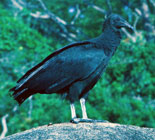 |
 |
 |
Press
"Film Calls for Conservation of Life in Biological Hot Spots"
Daily Bruin
By Seda Terzyan
Monday, May 5, 2008
With thousands of animal and plant species becoming extinct each day, many researchers call for a reversal of the destruction caused by human life to save the planet.
"Hotspots," a new documentary being screened exclusively at UCLA tonight, attempts to remind people of the greatness of the planet they inhabit and the importance of conserving life for medical purposes. It takes viewers on an adventure through a handful of the 35 most biologically rich life zones on earth.
"Humans are causing massive extinctions across all taxa, but we can come together and reverse these effects just by saving the hot spots," said professor Michael Tobias, the director of the film.
By making these locations a priority, conservation ecologists believe humans can affect the future of evolution on a large scale.
"Our footprint on the Earth is a powerful one, and it can be used for better or for worse," Tobias said. "The time to pour out our hearts and use technology to save the planet is now; it's time to give back."
The UCLA Stiles Program of Integrated Oncology, a unit of UCLA Jonsson Cancer Center, is sponsoring the "Hotspots" screening and wants to do just that – give back to the earth by taking the first step and engaging in a scientific discussion about the issues which will affect all people.
Dr. Richard Pietras, director of the Stiles Program, said about 80 percent of the world's population relies on medicines derived from natural products.
Two-thirds of current cancer therapies are based on herbal derivatives or other natural substances found in our environment.
But with the rapid rates of habitat destruction by humans speeding up extinctions, it may be the case that many rare plant species will be gone before they are even found.
"When we saw where current drugs came from, most were from herbal derivatives, and since our treatments are not the best in terms of reducing toxicity, we are constantly looking for better ways and looking for new plant extracts to use," Pietras said.
"The biggest concern is that many of the new medications will never be discovered since we have only seen the tip of the iceberg."
It is difficult to quantify the loss of thousands of species each day, he added.
The image of a worst-case scenario is portrayed in the film with its first destination, the historic Easter Island, which is presented as a dramatic example of how man destroyed his habitat, cutting down forests to make giant statues in reverence to a god, at a huge ecological cost.
"It is a message to us to take care of our resources unless we want to have same fate," Tobias said.
Another hot spot brings the movie even closer to home – Southern California is one of the top areas in the world that conservationists are working around the clock to preserve.
"We are living in an urban jungle with raccoons, possums, wild parrots, and the marine life is also breathtaking, as well as the unbelievable variety of insect species," said Jane Morrison, producer of "Hotspots" and a UCLA alumna.
Californians have an amazing backyard with coyotes and mountain lions, some of which are at risk of extinction, Morrison said.
With this film, the audience gets to see all that is really out there and what is being done to preserve these hot areas, Morrison added.
Dr. Russell Mittermeier, the president of Conservation International, a nonprofit working to protect biodiversity, leads the journey in the documentary to locations in Madagascar, Brazil, Peru, Chili, New Zealand and the United States.
Mittermeier brings the audience to the front lines with some life-forms and places that have not been filmed before.
"He is the Indiana Jones of natural science," Morrison said.
In addition to preserving the evolution of species on the planet and reversing ecological damage, the filmmakers also wanted to show audiences what they could lose.
Pietras said only 10 percent of the species living on Earth and coexisting with humans have been identified.
Humans must begin to recognize that they are just one of the many species inhabiting the earth, Tobias said.
"We know how to save these areas if we have the interest, willpower and government support called for by people getting more involved, voting and getting educated about the earth," he added.
"If we lose a rare butterfly, we are not sure what has been lost," he said. "Everyone must pitch in by not using bio-invasives, planting new plants, eating and purchasing ethically, without the death of creatures."
Just saving that spider crawling in the shower can be enough to save a member of an undiscovered species, Tobias added.
"There must be an 11th hour. We do not know how many extinctions it will take to end the whole thing," Tobias said.
The film seeks to bring about a revolution of thought, giving people hope by presenting an optimistic perspective of the future humans can create by working as one.
 BACK TO TOP
BACK TO TOP
 |
|
 |
|
"Film Calls for Conservation of Life in Biological Hot Spots"
Daily Bruin
By Seda Terzyan
Monday, May 5, 2008
With thousands of animal and plant species becoming extinct each day, many researchers call for a reversal of the destruction caused by human life to save the planet.
"Hotspots," a new documentary being screened exclusively at UCLA tonight, attempts to remind people of the greatness of the planet they inhabit and the importance of conserving life for medical purposes. It takes viewers on an adventure through a handful of the 35 most biologically rich life zones on earth.
"Humans are causing massive extinctions across all taxa, but we can come together and reverse these effects just by saving the hot spots," said professor Michael Tobias, the director of the film.
By making these locations a priority, conservation ecologists believe humans can affect the future of evolution on a large scale.
"Our footprint on the Earth is a powerful one, and it can be used for better or for worse," Tobias said. "The time to pour out our hearts and use technology to save the planet is now; it's time to give back."
The UCLA Stiles Program of Integrated Oncology, a unit of UCLA Jonsson Cancer Center, is sponsoring the "Hotspots" screening and wants to do just that – give back to the earth by taking the first step and engaging in a scientific discussion about the issues which will affect all people.
Dr. Richard Pietras, director of the Stiles Program, said about 80 percent of the world's population relies on medicines derived from natural products.
Two-thirds of current cancer therapies are based on herbal derivatives or other natural substances found in our environment.
But with the rapid rates of habitat destruction by humans speeding up extinctions, it may be the case that many rare plant species will be gone before they are even found.
"When we saw where current drugs came from, most were from herbal derivatives, and since our treatments are not the best in terms of reducing toxicity, we are constantly looking for better ways and looking for new plant extracts to use," Pietras said.
"The biggest concern is that many of the new medications will never be discovered since we have only seen the tip of the iceberg."
It is difficult to quantify the loss of thousands of species each day, he added.
The image of a worst-case scenario is portrayed in the film with its first destination, the historic Easter Island, which is presented as a dramatic example of how man destroyed his habitat, cutting down forests to make giant statues in reverence to a god, at a huge ecological cost.
"It is a message to us to take care of our resources unless we want to have same fate," Tobias said.
Another hot spot brings the movie even closer to home – Southern California is one of the top areas in the world that conservationists are working around the clock to preserve.
"We are living in an urban jungle with raccoons, possums, wild parrots, and the marine life is also breathtaking, as well as the unbelievable variety of insect species," said Jane Morrison, producer of "Hotspots" and a UCLA alumna.
Californians have an amazing backyard with coyotes and mountain lions, some of which are at risk of extinction, Morrison said.
With this film, the audience gets to see all that is really out there and what is being done to preserve these hot areas, Morrison added.
Dr. Russell Mittermeier, the president of Conservation International, a nonprofit working to protect biodiversity, leads the journey in the documentary to locations in Madagascar, Brazil, Peru, Chili, New Zealand and the United States.
Mittermeier brings the audience to the front lines with some life-forms and places that have not been filmed before.
"He is the Indiana Jones of natural science," Morrison said.
In addition to preserving the evolution of species on the planet and reversing ecological damage, the filmmakers also wanted to show audiences what they could lose.
Pietras said only 10 percent of the species living on Earth and coexisting with humans have been identified.
Humans must begin to recognize that they are just one of the many species inhabiting the earth, Tobias said.
"We know how to save these areas if we have the interest, willpower and government support called for by people getting more involved, voting and getting educated about the earth," he added.
"If we lose a rare butterfly, we are not sure what has been lost," he said. "Everyone must pitch in by not using bio-invasives, planting new plants, eating and purchasing ethically, without the death of creatures."
Just saving that spider crawling in the shower can be enough to save a member of an undiscovered species, Tobias added.
"There must be an 11th hour. We do not know how many extinctions it will take to end the whole thing," Tobias said.
The film seeks to bring about a revolution of thought, giving people hope by presenting an optimistic perspective of the future humans can create by working as one.

